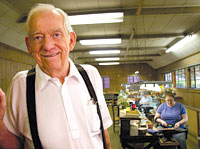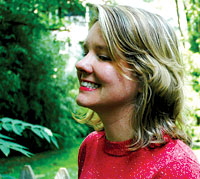Before there was Bele Chere—way before there was Bele Chere—there was the Craft Fair.

The fair has been called different names since its inception in 1948, but today it is known as the Craft Fair of the Southern Highlands, and this year marks its 60th anniversary.
Not surprisingly, times have changed since Asheville-based craft artist Ralph Morris of Stuart Nye Jewelry traveled over the mountains to Gatlinburg, Tenn., to exhibit at the very first fair. At the time, it was the largest gathering of working craftspeople ever assembled in the U.S. He remembers the 1948 fair being held under “a circus tent, and every afternoon it would rain and water would run underneath the tent. It [was] like a cooker [in there].” The fair moved to Asheville in 1951, and now fills two floors every July and October in the comfort of the Asheville Civic Center.
Stuart Nye started his business in 1933, and Morris’ father, a former retail merchant and jewelry buyer, became Stuart Nye’s partner after WWII. Morris began working for the family business after he graduated from college. Asked if he learned the trade from his father, Morris answered that in fact they “learned from one another. It wasn’t a matter of just one person teaching another. We all learned together.” He points out that, back then, “very few [craftspeople] were school-trained. A lot of them got into the same situation I did, where they went into the business and learned from doing.”

Today, the Southern Highland Craft Guild, which puts on the biannual fair, includes more than 900 active juried members from a nine-state region. John C. Campbell, who saw similarities between this mountainous Southern region and that of the Scottish Highlands, popularized the name “Southern Highlands” at the beginning of the 20th century. After his death, Campbell’s wife, Olive Dame Campbell, founded one of WNC’s renowned craft schools, the John C. Campbell Folk School, in 1925.
“One of the coolest things about crafts is that it can be learned so many different ways,” says the school’s director, Jan Davidson. Craft making, he says, has “a long history of being part of the household [in WNC] … and there are still woodworkers who are dad-trained, still craftspeople who are family-trained. That hasn’t died out.” However, he adds, craft schools such as the Folk School are able to “step in for those who may not have had a father who was a woodworker.”
Despite reports that the regional-craft industry is weakening—“I hear from people all the time that sales are off,” Handmade in America Associate Director Jenny Moore told Xpress’ Hanna Rachel Raskin in a recent article—the interest to learn a craft continues to grow.
Proof? Enrollment at John C. Campbell has gone up every year over the past 15 years Davidson has served as director.
Perhaps because more people are learning how to make crafts, there’s now a greater appreciation for what it takes to produce handcrafted items, which could explain why 11,000 visitors from across the country are expected to attend the upcoming four-day Craft Fair of the Southern Highlands, July 19-22, and why business at Stuart Nye Jewelry has continued to get busier.
According to Davidson, the idea of high-end craft isn’t new—it has always straddled functionality and fine art. “It’s always been a combination of both. And a lot of craft objects are still functional… . Now we have the choice of getting a disposable piece of junk, or something that brings joy to life.”
When you buy a handcrafted work, “it’s an economic statement, a political statement and a buy-local statement,” says Davidson. “You’re supporting your neighbors, while buying something of permanence and beauty.”
Plus, at the Craft Fair, you get the opportunity to shake hands with the maker.
Morris maintains the fair has always been “a good attraction.” In addition to the presence of craft artists working in pottery, fiber, wood, jewelry, metal and ever-more-inventive mediums, the July fair will feature a full schedule of live mountain music, and many of the more than 200 members of the Southern Highland Craft Guild who will be exhibiting will demonstrate their craft at their booths. Plus, there will be special demonstrations at both fairs this year to celebrate the anniversary.
Both Stuart Nye Jewelry and the John C. Campbell Folk School have exhibited at every Craft Fair since it began. As Davidson states, “It’s the original craft fair of the Southeast, and it’s still the best.”
The 60th Annual Craft Fair of the Southern Highlands will be held at the Asheville Civic Center Thursday, July 19, through Sunday, July 22, and again in October. Hours are Thursday through Saturday, 10 a.m.-6 p.m., and Sunday, 10 a.m.-5 p.m. $6. Free for children under 12. Group discounts are available. 298-7928. www.craftguild.org
Sounds of the Southern Highlands

Think of it as a mini Shindig on the Green, except air-conditioned and with the option to purchase a stoneware vase overlaid with a rare Kohiki glaze. The live-music lineup for the Craft Fair’s 60th anniversary is rich in mountain natives singing mountain songs. (Music runs Friday through Sunday.)
• Friday, July 20
1 p.m. Liz and Tim:
Husband-and-wife folk duo raised in musical mountain families.
3 p.m. Hogtown Squealers:
Old-time, honky-tonk and “obscure musical miscellany.”
• Saturday, July 21
11 a.m. Cary Fridley Band:
Local old-time singer with a spooky-lovely voice and a sumptuous repertoire.
12:30 p.m. Turnpike Trio:
Vocal roots.
2 p.m. Split Rail:
Harmony vocals is the hallmark of this group.
4 p.m. Fabulous Guildenaires:
Old-time N.C. mountain music personally influenced by the state’s late greats, including Tommy Jarrell.
• Sunday, July 22
11 a.m. The Doghouse Band:
Three-part harmonies and unlikely bluegrass covers.
1 p.m. Sherri Lynn and Mountain Friends:
High-energy “swing grass.”
3 p.m. Hot Duck Soup:
Expect odd instrumentation from this quirk-folk trio: Kazoos, an antique cornet and the always-underrated “cacophonium” is the short list.
— M.M.B.
Bring craft history into the future
While handcrafts play an important role in the history of Western North Carolina, the impact of artistic disciplines such as ceramics, weaving and hammered metals go deeper than either aesthetics or practicality.
By the mid-1800s, Industrialization had gripped Europe and the United States, making manufactured good both plentiful and inexpensive. However, philosophers such as author Thomas Carlyle and social critic John Ruskin questioned the cultural impact of the cheaper (and often poorer-quality) goods, going so far as to suggest that a dwindling interest in hand-made items thwarted community values.
However, hard daily necessity in the isolated Appalachians kept skills like toolmaking and home-spinning alive. As art aficionados (including the likes of Grove Park Inn designer Fred Seely and Roycroft Community founder Elbert Hubbard) developed an appreciation for these crafts, they sought out the mountain people—often tradesmen and farmers—who could still produce them. This craft revival extended into the early 1900s. Thus, what was once merely a means of survival became both a vital art form and an opportunity for a better life. Today, crafts enthusiasts can find these works on display at galleries and events like the Craft Fair of the Southern Highlands.
Last year, local educators, funded by the North Carolina State Library, embarked on an ambitious project to document the Historic Craft Revival. A Web site, database and community-training component aim at compiling photographs, letters, pamphlets, records and objects to form the complete story of this era. In essence, the low-tech tradition of handcrafts finds a high-tech ally in preservation. Partners in the project include Western Carolina University, Penland School of Crafts, the Southern Highland Craft Guild, The Museum of the Cherokee Indian, and the John C. Campbell Folk School.
The Craft Revival Web site, now operational, continues to add information. The project is ongoing through January 1, 2009. To learn more, visit craftrevival.wcu.edu or call 227-2499.
— Alli Marshall



Before you comment
The comments section is here to provide a platform for civil dialogue on the issues we face together as a local community. Xpress is committed to offering this platform for all voices, but when the tone of the discussion gets nasty or strays off topic, we believe many people choose not to participate. Xpress editors are determined to moderate comments to ensure a constructive interchange is maintained. All comments judged not to be in keeping with the spirit of civil discourse will be removed and repeat violators will be banned. See here for our terms of service. Thank you for being part of this effort to promote respectful discussion.